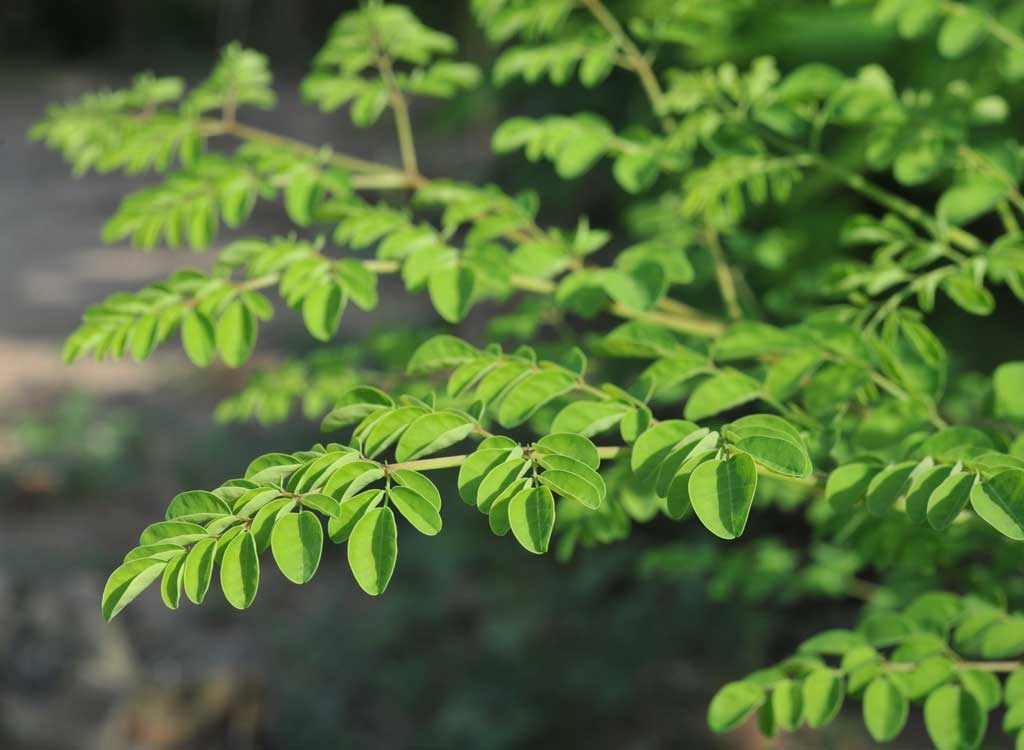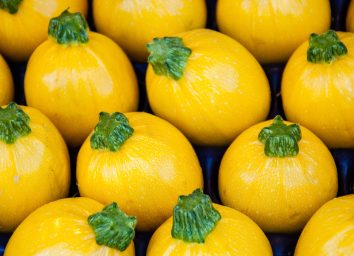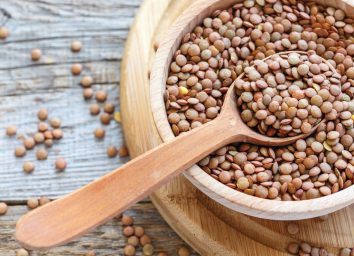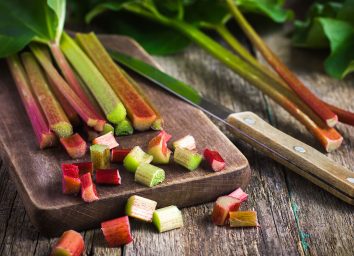Moringa: The Surprising Superfood With the Health Benefits You Need to Know About

Sure, you've heard about superfoods like kale and salmon, but one nutrient-packed plant you might not be familiar with yet is moringa. We're breaking down what the plant is, how you can use moringa powder in your diet, and what health benefits it can provide.
Moringa oliefera is also called the "horseradish tree" because of the flavor of its roots. It's also nicknamed the "drumstick tree" for the appearance of its long seed pods. It's grown in subtropical or tropical areas all over the world, but it has only recently been seen as a fresh option at the occasional American farmer's market. Native to South Asia, it's a familiar dietary staple for both people and livestock in Africa, Asia, and the Philippines.
The tree grows quickly, forming branches with small, tender leaves and green, slim pods filled with seeds. While it thrives in the sun and heat, moringa is only sporadically produced in the United States, mostly at the tip of Florida and the southern part of California.
What are the health benefits of moringa?
Like other superfoods, moringa is packed full of nutritional value. It boasts "seven times more vitamin C than oranges, ten times more vitamin A than carrots, 17 times more calcium than milk, nine times more protein than yogurt, 15 times more potassium than bananas, and 25 times more iron than spinach," according to a 2016 study published in the journal Food Science and Human Wellness.
Robin Foroutan, MS, RDN, HHC, a spokesperson for the Academy of Nutrition and Dietetics, believes in the antioxidant properties of moringa. "Moringa is great. It's one of the edible botanical plants that are very high in antioxidants. It's the antioxidant activity that gives it such a broad range of potential health benefits," she says. "The pods are high in vitamin C. It's a good source of vitamin A. There's betacarotene and potassium, but the antioxidants are one of the most important components of botanical herbs."
Still, Foroutan cautions on getting caught up on any one superfood. "With these types of foods, they sound like a panacea, and a lot of it comes down to the action of the antioxidants in the body and how they help us balance inflammation," she says. "That's why plants in general, including moringa, are important in overall health."
Plus, many of the studies on moringa have been performed on rats, rather than humans. But moringa is high in antioxidants, and it's a traditional part of an Ayurvedic diet. Moringa has been used in alternative medicine to do everything from help nursing mothers improve breastmilk flow to curing headaches and lowering blood sugar, though more research is needed to back up those claims.
How can you use moringa in your diet?
Almost every part of the tree can be used for food. The pods are highly prized for packing a nutritional punch. They are long and thin, able to be eaten like beans. The seeds can be removed from the pod and used like nuts. The flowers, when cooked, give dishes a slight mushroom taste, and the leaves can be included in a vast number of preparations.
Stephanie Jones, of Jones Creek Farm near Savannah, Georgia, uses moringa in a variety of dishes for her family. If she's not adding fresh leaves to her soups, stews, and pasta, she's air-drying the leaves and grinding them into powder form. To protect it from the heat, she typically adds moringa powder after cooking the rest of the dish.
"We plate up our food and bring it to the table and sprinkle it on like a seasoning," Jones says. "We are just adding all those nutrients to our food at every single meal."
Moringa blends well into many Indian recipes for Masoor Dal, vegetable curry, rasam, or sweet or savory puttu. The leaves can be scrambled with eggs for even more of a protein boost.
Where can you buy moringa?
One great place to start is your local farmer's market. Jones offers fresh moringa leaves at three farmer's markets near her farm and frequently walks into health food stores and fresh food markets to introduce them to the vegetable. "About half the people have no idea what I'm talking about," Jones says. "Most have never seen it fresh, just in supplement form."
Should you take moringa supplements?
As moringa isn't widely distributed fresh throughout the United States, many of the studies on its effects were performed using the powdered form of the plant. While very few side effects have been reported, there are several medications that could possibly be impacted by moringa. When taking medicine for thyroid, diabetes, and high blood pressure, it's best to communicate with your doctor to see if moringa is a good choice for your diet. If prescriptions are broken down by the liver, moringa may also affect the processing speed, which can change your results.
The bottom line
Plants have incredible benefits for our diets, and their true value is just beginning to be explored. "We focus so often on vitamins and minerals, but plants have this extensive biochemistry of antioxidants, of plant compounds and phytonutrients that have a wide range of beneficial effects on the body," Foroutan says. "It just underscores the importance of eating lots of plants." And that includes more than just the superfood veggies you're familiar with—plants like moringa can also have serious health benefits.








